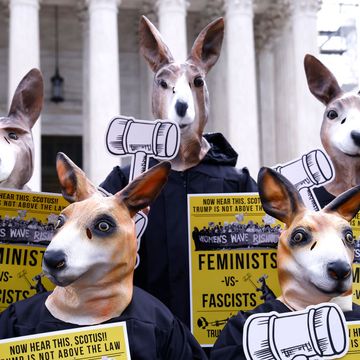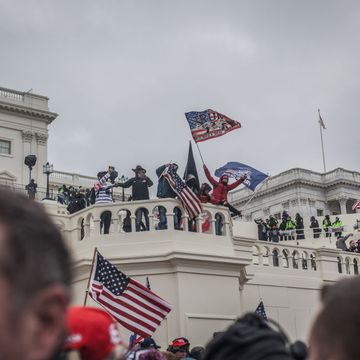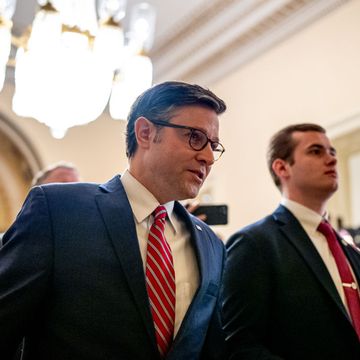Amy Chozick had some good work yesterday in The New York Times about the perilous prospects for the Democratic party in Arkansas, home state of the previous Democratic president and one-time workplace of the person who is the odds-on favorite to be the next one. Mike Beebe, the very popular Democratic governor, is term-limited and thus unable to run again. He likely would be re-elected easily if he could.
In 2010, the year the Tea Party pummeled the Democrats in congressional elections and the state legislature in Arkansas, Mr. Beebe won re-election, taking all 75 counties. While Mr. Obama's approval rating here is 29 percent, Mr. Beebe's at 72 percent makes him the most popular Democratic governor in the country, according to an NBC News/Marist poll conducted in September. How is he regarded? As one female political operative here put it, "He talks like molasses, and I want to have his babies." What is his philosophy? Centrist. "You could fall on your sword, but if it kills you, what good are you going to do?" Mr. Beebe often says.
(Note to Arkansas political elite: in the future, please keep that "female political operative" 30 miles from anyone with a notebook. Thank you.)
Meanwhile, the incumbent U.S. senator Mark Pryor is in a tooth-and-claw battle with rising young Republican charlatan Tom Cotton. Chozick does a nice job giving us a brief bio of Beebe, who really does seem like an interesting cat, and a solid thumbnail of Arkansas political history over the past several decades. However, she does fall victim to one of the real problems with covering politics in the days since the United States Supreme Court legitimized influence peddling in our elections. For example, in one place, Chozick talks about the transformation of the Arkansas electorate, and how the state has "moved right" over the years.
Instead, the state, with its yawning disparities in income and education, reflects to a heightened degree the struggles with inequality faced by many working-class people in the rest of the country: a sense of being buffeted by globalization, technology and a feeling of being left out. Those struggles have contributed to a cultural and political shift as residents have drawn inward and gravitated toward more conservative candidates. The rural poor who once formed the base of Franklin D. Roosevelt's Democratic Party now rail against government intrusion. The cultural shift is so profound that polls show even the last name Clinton might not get a Democrat elected in Arkansas today. Mr. Beebe, 67, is widely considered the last of his kind.
However, later, checking out a locally significant fish-fry, Chozick gives us a good, clear look at the trout in the pickle barrel.
That may not remain true in future election years as the quaintness of the fish fry collides with a post-Citizens-United era. An estimated $2 billion in outside money will be spent on advertising in congressional races across the country this election cycle, over $17 million of which has already been spent on the Senate race here in Arkansas. Mr. Pryor, 51, is in the lonely position of being the only remaining Democrat in the Arkansas congressional delegation. The Republican National Committee sees Mr. Pryor's race against Mr. Cotton as an opportunity to stake full claim to this state. Even supporters of Mr. Pryor and Mr. Cotton said that neither man has the gift for retail politics of so many of their predecessors. So while the coon suppers and festivals hosted by the local Lions Clubs are still must-stops for both men, the several thousand political TV spots in Arkansas this cycle, largely paid for by donors in California and New York, carry more weight than ever.
Chozick is in a bind here. She can't connect what would appear to be obvious dots -- that Arkansas is less "moving to the right" than it is being shoved in that direction by a resistless tide of campaign cash -- because to do so would be to deny the voters their agency in selecting their leaders, and that is a step too far for conventional political reporting. How do you prove someone has been conned? How do you prove that hundreds of thousands of people have fallen for the same sales pitch, rather than making their own independent decisions. The best example of this problem is the newly insane state of North Carolina, which saw its well-earned reputation for moderation and sensible government bought out from under it by Art Pope and the candidates he supported. How do you determine who is an involved citizen and who is simply an easy mark? The easy answer -- the marks are the people who consistently vote against their own interests - is inadequate now. People have decided that their "interests" are elsewhere -- in "values," or in some other pretty slogan. And have they really decided this, or just been sold on the idea? Caveat emptor politics never are a good idea, wedded, as they inevitably are, to Cui Bono? politics in a marriage of close cousins that has produced a deformed political system.
Citizens United -- and its ungodly spawn, McCutcheon -- have sent our politics into refraction. Nothing is what it appears to be any more. Chozick is right to point out that the result of the decision has been to create candidates drifting ever closer to the ideal of Nashville's Hal Phillip Walker, who campaigns through that film only as a voice from a sound truck. Thanks to John Roberts and Anthony Kennedy, we now have candidates who campaign primarily as characters in television commercials, like Flo from Progressive Insurance, or the two people in the bathtubs for Cialis. Moreover, the flood of money now flows so swiftly and powerfully, and so far underground, that the best you can do is guess what effect it is having on the process. Then, after it's over, ideology gets credit for what money has purchased. The new world of unregulated political money has given an even deeper sense of unreality to the way we govern ourselves. Nothing is as it seems to be. Nothing can be reckoned fully to be genuine. Not the polls. Not the campaigns. Not the candidates. Not even the results, truth be told. Unregulated political money has worked as an accelerant to all the worst aspects of modern political campaigns. More than ever before, our elections have become design contests.

Charles P Pierce is the author of four books, most recently Idiot America, and has been a working journalist since 1976. He lives near Boston and has three children.












